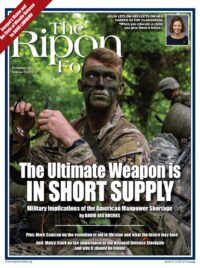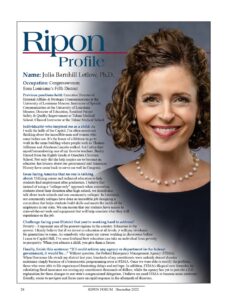Name: Julia Barnhill Letlow, Ph.D.
Occupation: Congresswoman from Louisiana’s Fifth District
Previous positions held: Executive Director of External Affairs & Strategic Communications at the University of Louisiana Monroe; Instructor of Speech Communication at the University of Louisiana Monroe: Director of Education. Resident Patient Safety & Quality Improvement at Tulane Medical School: Clinical Instructor at the Tulane Medical School
Individual(s) who inspired me as a child: As I walk the halls of the Capitol, I’m often awestruck thinking about the incredible men and women who came before me. It’s the honor of a lifetime to go to work in the same building where people such as Thomas Jefferson and Abraham Lincoln walked, but I often find myself remembering one of my favorite teachers, Becky Herrod from the Eighth Grade at Ouachita Christian School. Not only did she help inspire me to become an educator, her lessons about our government and American History have come back to serve me well in Congress
Issue facing America that no one is talking about: Utilizing career and technical education to help students find employment after graduation. I believe that instead of using a “college-only” approach when counseling students about their direction after high school, we should alsotalk about trade schools and our community colleges. In Louisiana, our community colleges have done an incredible job designing a curriculum that helps students build skills and meets the needs of the employers in our state. We can ensure that our students have access to state-of-the-art tools and equipment that will help simulate what they will experience on the job.
Challenge facing your District that you’re working hard to address: Poverty – I represent one of the poorest regions in the country. Education is the answer. I firmly believe that if we invest in education at all levels, it will pay dividends for generations to come. As somebody who spent my career working in classrooms before I came to Capitol Hill, I’ve seen firsthand how education can take an individual from poverty to prosperity. When you educate a child, you give them a future.
Finally, finish this sentence: “If I could reform any agency or department in the federal government, it would be…” Without question, the Federal Emergency Management Agency (FEMA). When Hurricane Ida struck my district last year, hundreds of my constituents were unfairly denied disaster assistance simply because of a bureaucratic programming error at FEMA.
Once we were able to rectify the problem, those who were able to file experienced frustrating delays and red tape. In addition, FEMA’s illogical new formulas for calculating flood insurance are costing my constituents thousands of dollars, while the agency has yet to provide a full explanation for these changes to our state’s congressional delegation. I believe we need FEMA to become more customer-friendly, easier to navigate and focus more on rapid response in the aftermath of disasters.





